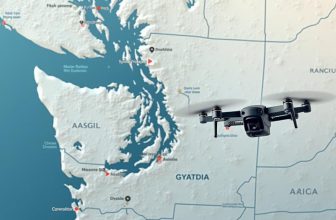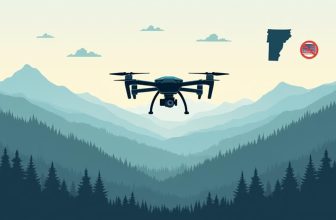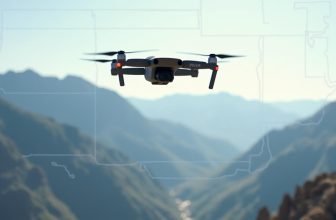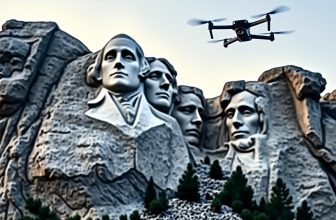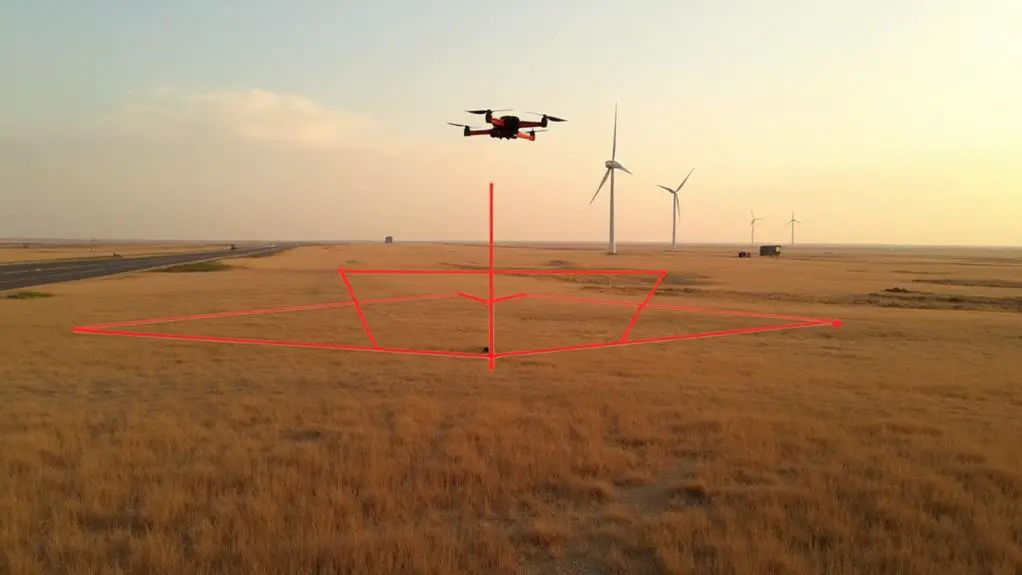
You operate a drone in North Dakota's vast skies, you fly over its rolling hills, and you capture its breathtaking landscapes. However, with these opportunities come strict regulations. As a drone user, you must navigate the state's complex drone laws, which vary depending on whether you're flying for recreation or commercial purposes. Understanding these laws is vital to avoid costly fines and penalties. But what exactly does it take to fly within the law in North Dakota, and how do you guarantee adherence to both state and federal regulations?
Contents
Key Takeaways
- Recreational drones over 0.55 pounds must be registered with the FAA in North Dakota.
- Drones must be labeled with a valid registration number and follow FAA safety guidelines.
- Commercial drone operators require pilot certification, passing the Part 107 knowledge test.
- Airspace restrictions, including national parks and airports, must be considered before flight.
- Failure to comply with drone laws can result in fines up to $27,500 and criminal charges.
Recreational Drone Use Laws
Most recreational drone users are unaware of the regulations governing their hobby.
In North Dakota, you must register your drone with the Federal Aviation Administration (FAA) if it weighs more than 0.55 pounds. You'll also need to follow the FAA's recreational drone safety guidelines, which include flying below 400 feet, maintaining line of sight, and avoiding restricted airspace.
To guarantee drone safety, you should also be aware of local regulations.
For example, some areas may have designated no-fly zones or require specific permits. Additionally, you should consider investing in drone insurance to protect yourself and others in case of an accident.
In North Dakota, you can fly your drone in state parks, but you must follow the park's rules and regulations.
You're also required to obtain permission from the landowner before flying over private property.
By following these rules and guidelines, you can help guarantee a safe and enjoyable drone flying experience.
It's crucial to stay informed about recreational drone use laws to avoid fines or penalties.
Commercial Drone Operation Rules
When operating a drone for commercial purposes, you must comply with specific regulations to guarantee safe and lawful flight operations.
To begin, you'll need to complete the drone registration process, which requires providing details about your drone and its intended use.
Additionally, you'll need to meet pilot certification requirements and adhere to airspace restrictions that apply to commercial drone operations.
Drone Registration Process
To operate a drone commercially, you must register it with the Federal Aviation Administration (FAA), a crucial step in complying with the agency's regulations.
You'll need to provide your name, email address, and physical address to create an account on the FAA's online registration system. You'll also need to pay a one-time registration fee of $5.
Once you've completed the registration process, you'll receive a unique registration number that you must affix to your drone. You can register multiple drones under a single registration number, as long as you're the owner of all the drones.
When registering, you must also agree to follow federal guidelines, including obtaining drone insurance if your drone weighs more than 0.55 pounds or if you plan to fly over people or in populated areas.
You must also keep your drone registration up to date and renew it every three years. Failure to register your drone or comply with federal guidelines can result in fines and penalties.
To guarantee safe and compliant drone operations, it's imperative to understand and follow the FAA's regulations.
Pilot Certification Requirements
Now that you've registered your drone with the FAA, it's time to focus on the next step: obtaining the required pilot certification.
As a commercial drone operator in North Dakota, you'll need to demonstrate Pilot Readiness and Aerial Competency to guarantee safe and responsible flight operations.
To achieve this, you'll need to pass the FAA's Part 107 knowledge test, which covers topics such as aircraft performance, weather, air traffic control procedures, and more.
The test consists of 60 multiple-choice questions, and you'll need to score at least 70% to pass.
You'll also need to be at least 16 years old, be able to read, speak, write, and understand English, and be in a physical and mental condition to safely operate a drone.
Once you've passed the knowledge test, you'll be issued a remote pilot certificate, which is valid for 24 months.
You'll need to complete a recurrent training program and pass a recurrent knowledge test every 24 months to maintain your certification.
Airspace Restrictions Apply
A key aspect of commercial drone operation rules in North Dakota is understanding and adhering to airspace restrictions.
You must be aware of the different types of airspace, including Class G, E, D, C, and B, and the specific regulations that apply to each. Airspace mapping tools can help you identify potential restrictions and plan your flight accordingly.
When planning a commercial drone operation, you must consider the airspace restrictions in the area you intend to fly.
This includes temporary flight restrictions (TFRs), national security areas, and areas with high levels of air traffic. You're responsible for verifying that your drone doesn't enter restricted airspace, which can result in serious consequences, including fines and penalties.
Effective flight planning involves identifying potential airspace restrictions, evaluating the risks associated with each restriction, and developing strategies to mitigate those risks.
You can use online resources, such as the Federal Aviation Administration's (FAA) airspace mapping tool, to help you plan your flight and guarantee compliance with airspace restrictions.
Drone Registration Requirements
As you prepare to operate your drone, you must comply with drone registration requirements, which vary depending on the drone's weight and intended use.
You'll need to register your drone if it weighs more than 0.55 pounds and is used for recreational or commercial purposes, but exemptions and exceptions may apply.
Additionally, you must guarantee your drone meets labeling requirements to maintain compliance with drone laws.
Registering Your Drone
When operating a drone in the United States, you must register it with the Federal Aviation Administration (FAA) if it weighs more than 0.55 pounds (250 grams) and less than 55 pounds (25 kilograms).
This registration process is a vital aspect of drone ownership, as it helps guarantee safety guidelines are followed.
To register your drone, you'll need to provide your name, email address, and physical address. You'll also need to pay a registration fee of $5, which is valid for three years.
Once you've completed the registration process, you'll receive a unique registration number that must be displayed on your drone.
This number is used to identify the drone and its owner, and it's imperative for tracking and enforcement purposes.
You can register your drone online through the FAA's website or through the FAA's B4UFLY app.
It's vital to note that you must be at least 13 years old to register a drone, and you must be a U.S. citizen or a representative of a U.S.-based company.
Exemptions and Exceptions
Operating your drone in the United States under certain conditions may exempt you from the registration requirements. You don't need to register your drone if it weighs less than 0.55 pounds and is flown exclusively for recreational purposes.
Additionally, you're exempt from registration if you're using your drone for educational or research purposes at an educational institution that has a Certificate of Waiver or Authorization (COA) from the Federal Aviation Administration (FAA).
If you're a public agency or a contractor working for a public agency, such as law enforcement, and you have a COA, you may also be exempt from registration. However, you must have a COA prior to operating your drone, and you must follow the guidelines outlined in the COA.
If you're operating your drone on Tribal lands, you must comply with Tribal regulations and obtain any necessary permits or approvals before flying.
It's essential to note that even if you're exempt from registration, you must still comply with all FAA regulations and guidelines related to drone operation. Failure to comply may result in fines or penalties.
Labeling Requirements Apply
Drone Laws in North Dakota
Labeling Requirements Apply
In accordance with Federal Aviation Administration (FAA) regulations, you must label your drone with its registration number if it weighs more than 0.55 pounds and is registered for recreational or commercial purposes.
This requirement confirms label compliance and proper drone markings, which are essential for identification and accountability.
To guarantee your drone meets the labeling requirements, follow these steps:
- Verify registration number: Confirm your drone's registration number is valid and up-to-date.
- Affix the label securely: Attach the label with the registration number in a visible and legible manner on the drone's exterior.
- Maintain label visibility: Guarantee the label remains visible and intact during operation.
Flight Restrictions and Zones
Flight restrictions and zones are crucial components of drone regulations, governing where and how you can fly your unmanned aerial vehicle (UAV). As a drone operator in North Dakota, crucially, you must comprehend these restrictions to avoid any penalties or accidents.
| Zone Type | Description | Restrictions |
|---|---|---|
| National Parks | Protected areas with unique natural features | No drone operations allowed within park boundaries without a special permit |
| Airspace Boundaries | Designated areas surrounding airports and military bases | No drone operations allowed within 5 miles of airports and 3 miles of military bases |
| Temporary Flight Restrictions (TFRs) | Areas with temporary restrictions due to weather, events, or emergencies | No drone operations allowed during the specified period |
| Controlled Airspace | Areas with high air traffic, such as near airports and urban centers | Obtain prior authorization from air traffic control before flying |
When flying your drone in North Dakota, you must adhere to these restrictions and zones to guarantee safe and responsible operations. Familiarize yourself with the specific regulations and guidelines for each zone to avoid any conflicts or penalties.
Pilot Certification and Training
Maintaining a high level of competence is essential for safe and responsible drone operations in North Dakota.
To achieve this, you must obtain the necessary certifications and training. The Federal Aviation Administration (FAA) requires drone pilots to hold a remote pilot certificate with a small unmanned aircraft systems (sUAS) rating.
To become certified, you must:
- Be at least 16 years old
- Pass a background check by the Transportation Security Administration (TSA)
- Pass a knowledge test on drone safety and regulations
In addition to certification, it's recommended that you receive training from a qualified instructor or pilot mentor.
This will help you develop the skills and knowledge needed to operate a drone safely and effectively.
Having a pilot mentor can also provide you with guidance on best practices and help you stay up-to-date on the latest regulations.
Moreover, having a certified and trained pilot can also be beneficial when applying for drone insurance, as it may reduce premiums and increase coverage.
Enforcement and Penalties
In accordance with the rules and regulations outlined by the Federal Aviation Administration (FAA), you can expect enforcement of drone laws in North Dakota to be strict and consistent.
Law enforcement agencies, such as local police departments and the North Dakota Highway Patrol, are responsible for enforcing drone laws and regulations within the state.
If you're found to be operating a drone in a reckless or negligent manner, or if you fail to comply with FAA regulations, you can expect to face penalties.
Fines imposed for violating drone laws in North Dakota can be substantial.
For example, if you're found to be operating a drone in a restricted airspace, you could face a fine of up to $27,500.
Additionally, if you're found to be operating a drone in a reckless or negligent manner, you could face a fine of up to $11,000.
In some cases, you may also face criminal charges, such as reckless endangerment or disorderly conduct.
It's crucial to familiarize yourself with drone laws and regulations in North Dakota to avoid facing these penalties.
Frequently Asked Questions
Can I Use Drones for Hunting in North Dakota?
You can't use drones for hunting to track or locate wildlife, but you can use them for wildlife surveillance and game scouting prior to hunting seasons, as long as the data isn't used during an active hunt.
Are There Drone Insurance Requirements in North Dakota?
You think flying high is carefree, but it's not. When operating drones in North Dakota, you're required to have drone coverage as part of your liability policies to guarantee you're protected in case of accidents.
Can I Fly Drones Over North Dakota State Parks?
When flying drones over public parks, you must determine park boundaries to avoid trespassing. In North Dakota, you can capture aerial photography within state parks, but you'll need permission for commercial filming.
How Do I Report a Drone Incident in North Dakota?
Like a vigilant air traffic controller, you'll navigate the skies safely by reporting drone incidents. To do so, you'll contact the North Dakota Department of Transportation or local authorities for Drone Safety Incident Reporting procedures.
Can Minors Operate Drones in North Dakota?
When operating drones, you should know that minors can fly them, but you'll typically need parental consent if you're under 18. Many organizations also offer youth education programs to teach safe drone operation practices.
Conclusion
You've learned the key drone laws in North Dakota. To recap, recreational and commercial drone operators must adhere to the FAA's guidelines, register their drones if they weigh over 0.55 pounds, and follow specific regulations. A notable statistic: the FAA reports that in 2020, there were over 1.7 million registered recreational drones in the United States. Understanding these laws is vital for safe and compliant drone operation, as non-compliance can result in significant fines and penalties.



